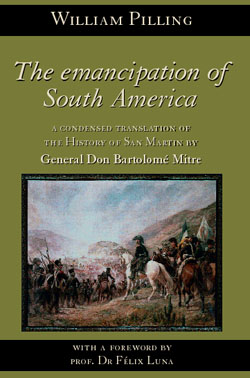The emancipation of
South America

Mitre, Bartolomé
 translation & abridgement by
translation & abridgement by William Pilling
of the original
Historia de San Martín
hardcover - 564 pages - In English
ISBN: 987-20506-0-0
Library of Congress Control Number: 0
Printed copy: U$ 86.18.- add to cart
Evaluation copy: U$ 56.02.- add to cart
Online access: U$ 9.99.- add to cart
Translator's preface
The title of this translation is the second title of the original “History of San Martin”. This transposition of title is an index to the relation which the translation bears to the original. This latter is truly a biography of San Martin, whose life could not be understood unless very full accounts were given of the events in which he took so prominent a part, therefore the biography is also a history.
No man who plays a prominent part in the history of a revolution can escape becoming involved in disputes with his contemporaries, and in many intricate questions which are of interest only to a very small number of their successors. These disputes and those questions greatly affect the career of a man, but have small influence upon the history of a Nation. Of such troubles San Martin had his full share, his biographer has entered fully into them, and with much detail has given proofs of the correctness of the view he takes of them. These details are, for the most part, suppressed in the translation, and all matters concerning San martin himself are greatly curtailed, while prominence is give to the events of the times in which the scene passes. The translation is thus a history in which enter the biographies of the two principal personages, San Martin and Bolivar.
This translation is intended only for the general mass of English-speaking readers, to whom minute details are wearisome, and is thus in every part a condensation of the copious accounts which are given in the original of the stirring events described. The student of history will not find in it that ample information which he requires, in order fully to understand the subject in all its bearings; for him the original provides a mine of historic wealth, enriched as it is with notes and with a voluminous appendix.
WILLIAM PILLING
London, March, 1893
1821–1906, Argentine statesman, general, and author, president of the republic (1862–68). An opponent of Juan Manuel de Rosas, he was forced into exile and had a colorful career as a soldier and journalist in Uruguay, Bolivia, Peru, and Chile. He returned to aid Urquiza in defeating Rosas (1852). A leader of the revolt of Buenos Aires against Urquiza’s federal system, Mitre held important posts in the provincial government after Buenos Aires seceded from the confederation. He was defeated by Urquiza in the civil war of 1859, and Buenos Aires reentered the confederation. As governor after 1860, he again assumed leadership when fresh difficulties led to open war in 1861. At Pavón he won a victory for Buenos Aires; he then assumed national authority. In Oct., 1862, Mitre was elected president, and national political unity was finally achieved; a period of internal progress and reform began. He served for a time as commander of the allied forces of Argentina, Brazil, and Uruguay in the war against Paraguay. His political views led to attacks by Alberdi. In 1868, Mitre was succeeded as president by Sarmiento, and although still a force in politics, he devoted himself chiefly to literary work. He founded La Nación (Buenos Aires), which became one of South America’s leading newspapers. Mitre was known in his youth as a poet and in later years as a historian. His important historical works are Historia de Belgrano (1858–59, 4th ed. 1887) and this Historia de San Martín y de la emancipación sudamericana (1877–88), translated and published in London at his request by William Pilling as The Emancipation of South America, (1893).





